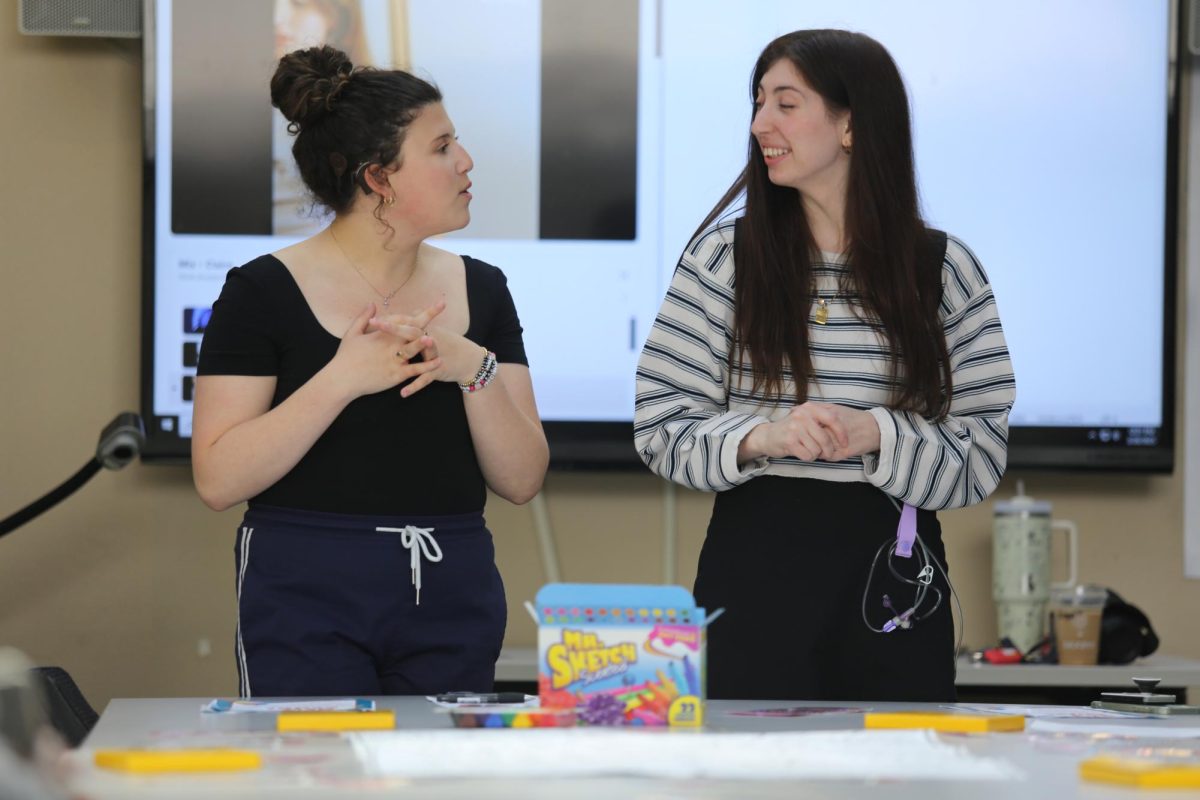
Disabled Student Union co-founders Lilly Cancellieri ’27 and Megan Eastman ’25 speak at the club’s first meeting, March 28. PHOTO: MADELINE WILLIAMS ’26/THE HAWK
When Megan Eastman ’25 came to the Hawk Hill campus for the first time as a first-year, the hilly campus and lack of ways to circumvent stair-laden buildings raised the question: How can St. Joe’s better support students like herself who have disabilities?
“When I started here at St. Joe’s, it was hard to find a community,” Eastman said. “There weren’t a lot of other people who fully understood.”
The Disabled Students Union is a new student organization on the Hawk Hill campus offering support and community for students with and without disabilities. Co-founded by Eastman and Lilly Cancellieri ’27, the fledgling organization hopes to offer a safe space for all students, teach the importance of advocacy and spread awareness of the issues facing disabled students.
“I think definitely a main [goal of DSU] is creating a sense of community, helping people realize they’re not alone,” Eastman said.
Cancellieri and Eastman met through Phi Sigma Phi, a national, gender-inclusive, honor fraternity, in which Cancellieri became Eastman’s “little brother,” or mentee. They talked together and wondered why there was not already a space where students with disabilities could come together. Uniting their different perspectives rooted in their respective disabilities, they co-founded DSU in March.
Eastman has a combination of Ehlers-Danlos syndrome, a connective tissue disorder that affects the skin, joints and blood vessel walls, and spastic triplegia, a form of cerebral palsy in which three limbs are affected by a movement disorder. For Eastman, this means she does not have use of her left hand, is tube-fed, and walks with a limp. When she developed her disability as a teenager, Eastman said she wished she could have met other people with mobility impairments to gain a “sense of understanding and fellowship with other people.”
Cancellieri has Usher syndrome, an inherited disability that affects hearing and vision, which for Cancellieri has resulted in hearing loss requiring cochlear implants and retinitis pigmentosa, an eye disease that causes progressive blindness. Cancellieri said both are classified as invisible disabilities, or disabilities that are not easily recognizable.
“Disability can come in all shapes and sizes,” Cancellieri said. “It doesn’t have to look, quote, unquote, ‘like a disability.’ But even when it does, you can’t look at someone and just judge a disability based on what you see or don’t see.”
Eastman and Cancellieri came together with different experiences regarding visible and invisible disabilities, and this helped them decide on the organization’s goals, Cancellieri said.
“I want to, first and foremost, bring confidence to everyone at St. Joe’s who has a disability, help them learn how to advocate for themselves, whether they’re in a confident place right now or whether they need help to find it,” Cancellieri said. “Disability is tough because it’s not your fault. There’s nothing you can really do about it. It’s all about adapting, and I want to make it clear that those with disabilities are not alone, that they have this whole support system behind them.”
Eastman said one reason, among many, that the DSU is important for St. Joe’s is it will promote accessibility in higher education and increase awareness about the barriers students with disabilities can face in college settings.
“I think it’s important to let everyone know that students with disabilities can go to college,” Eastman said. “They can be successful, if given the right support, if things are made accessible.”
The organization also places a strong emphasis on allyship and how students can advocate for each other, regardless of whether they have a disability.
“It’s important because it brings about awareness about disabilities,” said Patricia Gregg ’15, MBA ’20, director of the Office of Student Disability Services and DSU’s advisor. “You don’t have to be a student with a disability to join the club. They’re looking for people to advocate for them, to be an ally, to connect with other people.”
Cancellieri and Eastman said they want to create a space where those virtues of advocacy and allyship can flourish. The co-founders have a slew of plans, which include discussion panels and a new board that would include both disabled students and allies.
“The second goal [of the DSU] was to bring together a support team of those allies without disabilities that want to help and to show that there are people out there who want to help, whether they have a disability or not, but also showing those people how they can help,” Cancellieri said.
Preparation and allyship are important parts of the Disabled Students Union. Cancellieri said that for students with disabilities, learning how to advocate for themselves in a post-college world is paramount.
“If you don’t feel safe enough to use your voice and advocate for yourself, you’re not going to do it,” Cancellieri said. “We start here, and on campus is a safe place for you to practice that advocacy, especially in your classes. We want to have that safe space for us as a club, but also expand it to all of your classes, and then off campus, in your jobs, and ultimately, in your real life.”